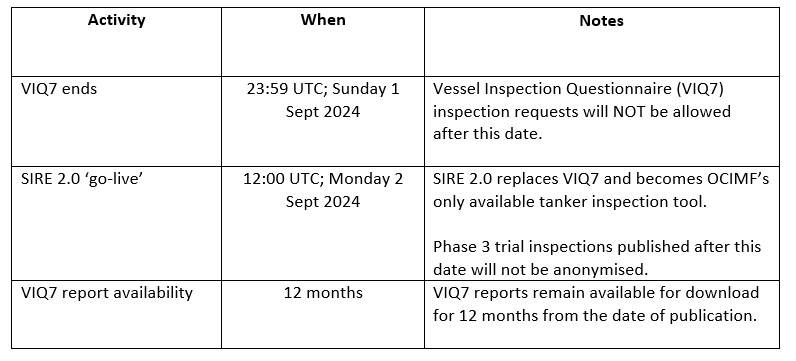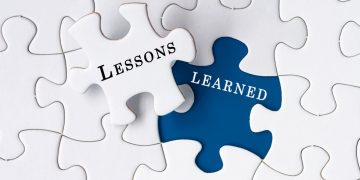The Oil Companies International Marine Forum (OCIMF) has confirmed that its digitalised Ship Inspection Report Programme (SIRE 2.0) is scheduled to ‘go-live’ on Monday 2 September 2024 and become the standard tanker inspection tool for the marine industry.
The final transition to SIRE 2.0 and the withdrawal of the option to request a SIRE Vessel Inspection Questionnaire (VIQ7) inspection from Monday 2 September 2024 has been given now that all pre-agreed ‘Critical Success Factors’ for going live have been met and approved by the OCIMF Vessel Inspection Programme Steering Group, Programmes Committee and OCIMF Executive Committee (ExCom).
This move to SIRE 2.0 will mark the end of the phased transition to the updated, enhanced and digitalised tanker inspection programme which is expected to transform how the marine industry assesses the safety and operational condition of tankers and their crew on an ongoing basis.
OCIMF implemented a multiphase roll-out programme to ensure industry had the opportunity to engage with SIRE 2.0 before it became the standard inspection tool. A significant number of SIRE 2.0 inspections have been completed in Phase 3 enabling all sectors of the industry to fully participate as well as supporting the full end-to-end testing of the SIRE 2.0 system.
… said Aaron Cooper, Programmes Director, OCIMF. Aaron Cooper had previously clarified that if all guidelines are followed and training materials are used—including those designed specifically for training vessel crew—the transition to SIRE 2.0 is manageable for programme users.
Aaron Cooper also said that he could not emphasise enough the importance for all programme users to use the next 60 days to prepare for the permanent transition to SIRE 2.0. He mentioned that during this period, Phase 3 inspections would still be available, and programme users should ensure that personnel at sea and onshore are fully familiarised with the new inspection process, procedures, and guidance.
Additionally, he advised that they should ensure their own in-house procedures, tools, and systems are aligned. He also suggested using this time to complete the Pre-Inspection Questionnaire work before the go-live.
Key facts about SIRE 2.0
- SIRE 2.0 is a digitalized program with physical inspections.
- It aims to accurately report vessel and crew quality continuously.
- The program uses a risk-based approach and enhanced tools for reporting outcomes.
- OCIMF has phased the rollout over the past year. Phase 3 acts as an industry-wide beta-testing phase that allows stakeholders to familiarize themselves with the new inspection process.
- The program requires a cultural shift in the industry. Stakeholders need to adjust logistically and operationally.
- It accommodates significant changes to tanker inspections.
The move to the digitalised inspection programme means that every tanker inspection will be bespoke and tailored to the individual vessel and its risk-profile and will require vessel operators and their crew to be prepared to respond to any potential inspection question from the SIRE 2.0 Question Library.
Using their intrinsically-safe tablet devices, SIRE 2.0 inspectors will provide a response to each question in the inspection’s unique Compiled Vessel Inspection Questionnaire (CVIQ) in relation to Hardware, Processes and Human Factors.
This will provide programme recipients with inspection reports that contain marine assurance data, information and feedback with greater detail than the existing SIRE reports.
OCIMF advises industry to use all the documentation and training resources available on the OCIMF website to ensure that personnel at sea and onshore are prepared for SIRE 2.0 inspections.

In an exclusive interview with SAFETY4SEA at the 2024 Posidonia exhibition, Anastasios Kartsimadakis, Group Vetting & Inspections Manager at Tsakos Shipping and Trading, explained that the SIRE 2.0 program will elevate the standards of inspections. This will be achieved by conducting thorough onboard inspections, with a particular focus on assessing human factors. You can watch the full interview bellow:


































































